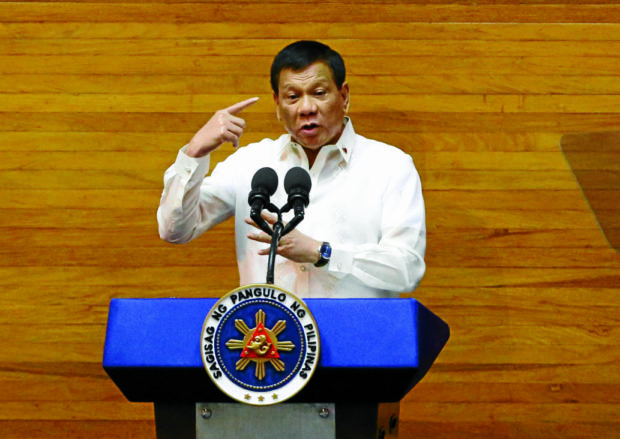
President Rodrigo Duterte gestures during his second State of the Nation Address on July 24, 2017 at the Batasan Pambansa during a joint session of Congress. (INQUIRER PHOTO/ JOAN BONDOC)
MANILA — For Akbayan Party-list Rep. Tomasito Villarin, Monday’s two-hour State of the Nation Address was just a “classic Duterte showtime.”
“Rambling, shouting, warning, and bullying his ‘enemies.’ He knows what issues click, what emojis to use. To be populist than being right,” said Villarin, a member of the opposition Magnificent Seven bloc.
Amid all that, Villarin pointed out that he failed to mention certain key social issues including those that have been part of his campaign promises.
“Again, no mention of endo, coconut farmers’ trust fund, other social legislation. Frustrating!” he said in a message sent to reporters.
Anakpawis Party-list Rep. Ariel Casilao of the militant Makabayan bloc said Mr. Duterte “missed the opportunity to revert back to the path towards fundamental reforms for the benefit of the marginalized sector.”
Casilao noted that the President sidestepped the issue of genuine agrarian reform, and criticized his “skewed” statement on the utilization of national resources because “he embraces the messianic belief the foreign investments via foreign monopoly will build the national industry in the country.”
Like Villarin, he also slammed the “total omission” of his campaign promise to end contractualization.
He said the President only continued to coddle military abuses and neglected the state of farmers and indigenous peoples in Mindanao.
“He never assured the people of Mindanao of safety, of being subjected under a martial law rule and condemned them to the abuses of state forces,” Casilao said.
Meanwhile, Dinagat Islands Rep. Kaka Bag-ao of the Liberal Party said the SONA seemingly only “focused on a single issue—the war against drugs, which has turned into a war against the poor.”
“This Administration is led by Mindanaoans—this should entail a better potential for the development of the provinces of Mindanao. However, one year into the term, the most glaring occurrence that we have in Mindanao is an extended martial law,” Bag-ao said.
“We need policies that are effective not because they are based on fear, but on facts,” she added. “We need comprehensive solutions that are anchored on our fundamental values, not simplistic, single-issue
responses that are based on a hunger for violence.”
On the other hand, she credited Mr. Duterte’s mention of the proposed National Land Use Act, which she had championed.
“In the coming year, I hope we can truly fight for progressive causes here in Congress, and not fight against repressive proposals like the death penalty or criminalizing children,” she said.
Deputy Speaker Fredenil Castro and Muntinlupa City Rep. Rozzano Rufino Biazon, meanwhile, lauded the President’s pronouncements on the allocation of resources to the armed forces, response to climate change, destructive mining, and disaster mitigation.
Castro said the President’s SONA was a SONA “stripped of imaginary situations aimed at playing on the imagination of the nation.”
“It was straight, real and frank, capable of evaluation if not quantification to evaluate his actual performance,” he told the Philippine Daily Inquirer in a text message.
Biazon and Eastern Samar Rep. Ben Evardone specifically zeroed in on Mr. Duterte’s call for the return of the Balangiga bells to the country.
“But I would have appreciated it even more if a more assertive statement on our rights to the west Philippine sea was given on top of it being addressed at a certain time,” Biazon said. It may be noted that Mr. Duterte only mentioned the said issue in a throwaway line.
Biazon, who is a vice-chair of the House national defense committee, said he agreed that “we should already render irrelevant those left leaders who are outside the country and begin peace efforts locally.”
“I would even go so far as say that the government deal with the rebels even on a per province level. Divide and conquer them,” he told the Inquirer.
He acknowledged that Mr. Duterte’s words against human rights advocates “may have been harsh.”
“But I think it’s quite obvious that it is brought about by his passion in the fight against drugs and criminality,” he said. “But of course, government should always take action within the bounds of
rights enshrined in the constitution and international agreements on human rights.”
The INQUIRER counted a total of around 80 rounds of applause throughout the two-hour speech that mostly tackled the criticism on his war on drugs, martial law in Mindanao, destructive mining, disaster mitigation, the death penalty, the falling-out with the communist groups with whom he had been negotiating peace, the foreign policy pivot towards China, the United States’ abuses during the 1901 Balangiga massacre, the effect of strict procurement regulations on military purchases, the effect of the Supreme Court’s ruling ordering the Food and Drug Administration to entertain opposition prior to the
approval of contraceptives, and tax reform. SFM